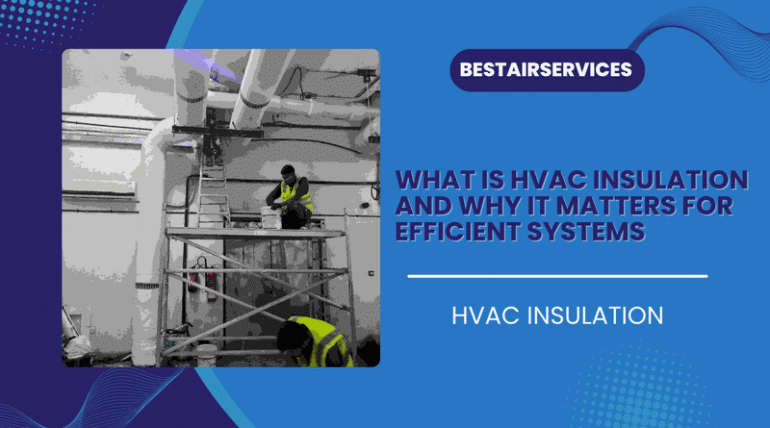
October 23, 2025
When it comes to maintaining optimal energy performance in cooling and heating systems, HVAC insulation plays a crucial role. Simply put, HVAC insulation refers to the materials and methods used to reduce heat transfer in ducts, pipes, and air-handling units. This process helps maintain the desired air temperature throughout the system, improving comfort and reducing energy loss.
According to Wikipedia, thermal insulation is the reduction of heat transfer between objects in thermal contact or within the range of radiative influence. In HVAC systems, insulation keeps cool air cool and warm air warm, ensuring that energy isn’t wasted as air travels through ducts or piping.
Why HVAC Insulation is Important
Without proper insulation, even the most advanced HVAC system will underperform. Here’s why it matters:
- Energy Efficiency: Well-insulated ducts and pipes minimize heat gain and loss, reducing system workload and electricity consumption.
- Condensation Control: Proper insulation prevents moisture buildup, avoiding corrosion and mold growth.
- Noise Reduction: Insulated ducts also reduce the sound of air movement and equipment operation.
- Longer Equipment Life: Reducing system strain through effective insulation increases component lifespan.
A report by the International Energy Agency (IEA) highlights that effective insulation can reduce HVAC energy consumption by up to 30%, a significant saving for commercial facilities.
Types of HVAC Insulation Materials
Different HVAC components require specific materials to perform optimally.
1. Fiberglass Insulation
One of the most common types, fiberglass offers excellent thermal resistance and sound absorption. It’s used in ducts and large air-handling units.
2. Foam Board Insulation
Lightweight and moisture-resistant, foam boards are ideal for exterior HVAC ducts exposed to harsh weather conditions.
3. Elastomeric Foam
This closed-cell insulation material is flexible, durable, and ideal for chilled water piping systems.
4. Mineral Wool
With its high-temperature resistance, mineral wool is used in industrial AC and Refrigeation systems where both heat and sound insulation are needed.
For more insights into advanced insulation technologies, check ScienceDirect’s overview of thermal insulation materials.
Applications of HVAC Insulation in Commercial Systems
In commercial and industrial settings, insulation is used across:
- Air Ducts: To prevent energy loss and condensation.
- Piping Systems: Especially for chilled and hot water lines.
- Air Handling Units (AHUs): To enhance cooling efficiency and reduce noise.
- Cold Rooms and Freezers: To maintain consistent internal temperatures.
If your business relies on precise temperature control, explore our industrial and commercial cold room solutions to ensure energy-efficient performance.
HVAC Insulation Maintenance
Even the best insulation materials degrade over time. Regular inspection and maintenance help identify issues like moisture infiltration or compression that reduce insulation effectiveness.
At BestAir Services, we offer comprehensive HVAC maintenance services that include insulation inspection, repair, and replacement. This proactive approach ensures your system runs efficiently year-round.
Benefits of Professional HVAC Insulation
Choosing professional insulation works and installation provides measurable benefits:
- Consistent indoor climate control
- Reduced energy bills and carbon footprint
- Compliance with local building and environmental regulations
- Improved air quality and comfort
For businesses operating in hot climates like the Ajman and allover UAE, efficient insulation can mean the difference between excessive energy use and sustainable cooling.
Sustainability and Energy Efficiency
Sustainability is a major focus in modern HVAC design. According to UN Environment Programme, improving insulation across commercial air conditioning and refrigeration systems globally could cut energy-related CO₂ emissions by 10–15%.
That’s why insulation isn’t just about comfort—it’s a strategic step toward energy efficiency and environmental responsibility.
When to Upgrade Your HVAC Insulation
Consider upgrading your insulation system if you notice:
- Increased energy bills without a clear cause
- Inconsistent cooling or heating
- Condensation or dampness near ducts
- Visible insulation wear or damage
Our HVAC repair and retrofit services can assess your system and recommend efficient upgrade options for long-term savings.
Conclusion
Understanding HVAC insulation and its role in efficiency is essential for businesses seeking cost-effective climate control. Proper insulation supports energy conservation, reduces operating costs, and extends system lifespan.
At BestAir Services, we help businesses across the UAE achieve superior performance through expert insulation and HVAC maintenance solutions tailored to their needs.


